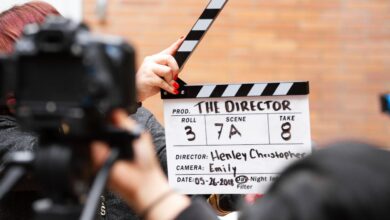Rhino Entertainment a Harmonious Journey Through Music

Rhino Entertainment Company produces novelty albums, archive reissues, definitive anthologies of music, and different artist collections. It also runs Kid Rhino, a line of children’s entertainment products, and Rhino Home Video. Rhino is a company that archives pop culture and claims the following: “Rhino Records is the record label that collects and preserves music, so it doesn’t require.” The lives of managing director Harold Bronson and president Richard Foos make up the majority of Rhino Entertainment’s history. In the 1960s, Foos, a collector and passionate music enthusiast, was a sociology student at the University of Southern California. Bronson was employed as a student representative at the University of California, Los Angeles (UCLA) as a student representative for Columbia Records. Foos was inspired at a local swap meet by a dealer he saw at the used record store who was offering thousands of LPs for $3. The store was making good profits because it was selling each LP for one dollar. Foos purchased his collection of $3 records at Aaron’s, the same record store. The venture started in the car’s trunk by taking it to the flea market in an attempt to sell classic blues and jazz recordings. Later, in October 1973, Richard Foos opened a store on Westwood Boulevard, a few blocks south of UCLA, and that’s how Rhino Records was born. Eventually, Harold Bronson was brought on to manage the company.
Understanding Rhino Entertainment

The store, at the time, was stuffed with old tables and chairs and a myriad of ideas. The absence of customers during the initial days allowed Foos and Bronson more time to think about promotions. Bronson started to introduce customer-attraction events that exhibited a slightly eccentric Rhino Entertainment look, such as Polka Day, Redneck Day, and Hassle the Salesman Day. A few years later, as an advertisement in 1975, the first real Rhino record, a 45 rpm vinyl release titled “Go to Rhino Records” sung by an eccentric street musician from the area called Wild Man Fischer, and distributed for free at the retail shop. After local radio stations started playing the album, Rhino earned an underground fan base, and business began to grow. In 1978 it was the year that the Rhino Label was founded by Fischer, who released a full-length album, Wildmania that was which was recorded in part in Dodger Stadium and produced by Harold Bronson for $500. In November of 1978, Rhino carved a niche for itself by releasing its first reissue, a photo disc by the pop of the 1960s group The Turtles. This was the first stage in the plan to reissue the complete Turtles catalogue. The idea behind re-releases of songs that were novelty or classics was to make records that did not exist and that the partners Foos as well as Bronson would be willing to purchase. Reissues would be a huge source of revenue for Rhino Entertainment, and the company had a successful beginning. The label earned more than $60,000 during the first year. Even though financial success was on the way for their shoulders, Foos and Bronson maintained a low-budget environment, including furniture from thrift shops and taking on small-sized salaries, as well as employing the copy machine at the local stationery shop rather than purchasing the one they had, as well as creating an employee-run schedule for cleaning the bathrooms. The company’s growth continued, and by 1983, Rhino was a $2 million business. Foos was persuaded to purchase an old copy machine, but the rustic style of the office maintained its dominance. The employees have always been a key element of Rhino’s culture and operations, showcasing Rhino’s distinctive “take” on music and pop culture for the consumer. Foos and Bronson ensure that their employees are enthused by popular culture, and they meet at least every 6 months to manage the business democratically. The employees are encouraged to come up with concepts for products according to their music preferences, and the Big Ideas program offers an incentive to those who bring forward new ideas. As time passes employees-focused rituals like open forum meetings would be established. A proportion of salaried employees’ wages would be based on the company’s performance, and the credits for Rhino products highlight employees who were directly involved in the release. So, when they invest in a variety of ways for the future of the company, employees play an extreme part in the story of success for Rhino Entertainment. Another distinctive aspect of the Rhino brand’s identity is the emphasis it places on social responsibility. The covers of their releases often contain information about issues that range in scope from AIDS to homelessness and the overpopulation of animals. Additionally, the selling of reissues within the framework of social consciousness uses releases that are commercially available of icons from culture to help understand the past that is not so distant. The proceeds from sales of albums are usually given to charities that are relevant as well as Rhino was involved throughout time with nationwide causes (such as the Rock the Vote campaign and the “Ban the Box” campaign for CDs) and also communities in the area (specifically the Wooten Center which is a Los Angeles inner-city recreation and education centre). Rhino was the first to go out on a path in April 1984 and released the first spoken-word/comedy album in the history of music, The Firesign Theater’s Three Faces of Al The company also released The Turtles’ Greatest Hits as well as Jerry Lee Lewis The Best Hits. The following year saw the introduction of Rhino Entertainment Home Video and its publication of My Breakfast With Blassie, which was a satire on the Louis Malle movie My Dinner Andre, which starred comedian Andy Kaufman and wrestler Freddie Blassie. In the fall of 1985, Rhino was on the verge of ending its independent distribution and had signed in 1985 with Capitol Records for distribution through CEMA. It was in 1987 that Rhino hit its very first top-ten single when Billy Vera’s soulful pop song “At This Moment” made it to the top of the Billboard Hot 100 singles chart. In February, the single became Rhino’s very first RIAA gold single. Then, in March, the whole collection (By Demand, The Very Best Of Billy Vera & The Beaters) became Rhino’s first gold-plated album. They were selling more than 50,000 units of the album every day, and the album’s success nearly led to catastrophe. Foos and Bronson tried for a full year to create a new gold single, but they had to stop their efforts after they wasted a significant amount of money.
Perspectives of Company

Rhino Entertainment is the music industry’s archive of pop culture which is responsible for predicting, nurturing, and inventing new musical trends. Alongside Rhino Records, Rhino has home video and family (children’s) mail-order film, book and mail-order divisions. Operating as a privately-owned business the co-founders of Rhino Entertainment, Richard Foos and Harold Bronson work to adopt the most inclusive, democratic, and environmentally friendly practices. The company is committed to preserving and making accessible original recordings of the most popular songs in every genre, including nostalgia pop rock ‘n’ roll, pop blues, jazz, R&B hip-hop, disco and folk Cajun, Latin, and many more, in addition to comics, spoken words and video. A variety of partnerships helped to bring Rhino’s products to a wider audience in 1993. The company was able to acquire a line of spoken-word tapes produced by clothing manufacturer Esprit which included recordings of social issue lecturers like Gloria Steinem as well as Jeremy Rifkin. Through the clothing, craft, and accessories retailer Putmayo, Rhino released a collection of world music albums that were available through Putmayo retail stores. Kid Rhino and McDonald’s embarked on a new partnership in 1993. The two companies collaborated to make recordings that featured McDonaldland characters like Ronald McDonald. Ronald Creates Magic the first joint product came out the following year. A mega licensing arrangement was struck in conjunction with Warner Bros. Animation, which secured the rights of Kid Rhino to release audio albums featuring voices of iconic Looney Tunes characters as well as three new characters in the mix (Yakko, Wakko, and Dot). The agreement produced a hugely popular debut album with silly songs from Steven Spielberg’s Fox Children’s Network television series Animaniacs. In a bid to revive the folk festival tradition Rhino Entertainment was joined by Ben & Jerry’s and Concert Associates to host two days of “Troubadours of the Folk Based on Rhino’s book of the same name, the “Festival” took place at UCLA in the summer of 1993, showcasing performances by over thirty folk artists from the present, past, and future. The event later became a PBS special, and then was aired through Rhino Home Video both in 1994 and. The festival was the first of its kind that was this large that was held in Los Angeles. Los Angeles area in 25 years, the festival featured folk musicians from the past and current along with a craft fair and 200 stalls. The company was recognized for its serious film production in 1993 the year the film The Panama Deception, a Rhino Entertainment Home Video coproduction, won the Academy Award for Best Documentary. To add to the accolades, Rhino International received its first gold-certified record, the French publication of Aretha Franklin’s Greatest Hits. Another new step was the FORWARD label, which focuses on the latest songs by established artists like BeauSoleil, Todd Rundgren, Richie Havens, and NRBQ–and the relaunch of Atlantic Records’ jazz catalogue. The label also released the first major retrospective of late 1970s and early 80s punk powerpop, punk, and new wave music, a nine-volume set dubbed “DIY” (Do the work yourself). This collection was targeted to the older crowd who were able to remember the songs as well as younger audiences aged between 16 and 30 who participated in the revival of punk music that created and shaped the Seattle Grunge style including groups such as Nirvana, Pearl Jam and Soundgarden. Rhino was Sweet sixteen in the year 1994. The company celebrated the occasion as an identity-building tour across the country. The accolades for Rhino releases were abundant in 1994. The third RIAA album of gold was officially certified, Billboard’s Greatest Christmas Hits (1955-resent). The album received two Grammy nominations announced in the year that the BeauSoleil album La Danse de la Vie was nominated for the Best Contemporary Folk Grammy and the Monterey International Pop Festival box set received an award to be the Best Historical Album. Then, The Best of War … and More was awarded RIAA the gold certificate. In 1994, in the spring, Rhino and the Library of Congress signed an agreement that allowed Rhino Entertainment to create and publish anthologies of historical recordings from the archives of the nation The first planned project consisted of a box containing Presidential speeches. The agreement was the first arrangement for licensing and production between a label and the Library of Congress. Rhino also bought a license to the Monkees catalog, and later video clips from their television series as well as specials were released as well as the film Head which was a brand new Monkees feature film, as well as the reissues of all nine Monkees albums, including previously released bonus tracks as well as updated liner notes. Two divisions were created, Rhino Films, and Rhino Books. The 1970s drew further in the distance, and Rhino unveiled the first five volumes of Just Can’t Stop Enough, New Wave Songs from the 1980s. With a focus on the future and the historical past, Rhino went online in October 1994 on CompuServe. Revenues for 1994 were record-breaking and surpassed the mark of $65 million. In 1995, new ventures began with the 1995 release of Rhino announced its partnership in 1995 with Turner Entertainment Co., making classic soundtrack albums of M-G-M movies. Rhino Movie Music would release soundtracks with Turner Classic Movies. Turner Classic Movies cable television network. These include Doctor Zhivago, Show Boat, Meet Me In St. Louis, Easter Parade, North By Northwest, and That’s Entertainment! This collection was called the Ultimate Anthology of M-G-M Musicals and Lullaby of Broadway, The Top Ever of Busby Berkeley in Warner Bros. Turner, and Rhino’s The Wizard of Oz soundtrack collection became a huge success for the company. Likewise, the release of a box set featuring John Coltrane recordings from The Heavyweight Champion The Full Atlantic Recordings was a well-respected jazz concert. An arrangement for catalogues in conjunction with Elektra Entertainment resulted in the publication of Love Story, 1966-1972 the double-CD collection of the 1960s ‘ psychedelic group Love.
Diverse Catalogue and Awards

Its debut was in the films, Rhino Films was expected to wrap up the production of its very first production, Plump Fiction, with Julie Brown, Sandra Bernhard, Tommy Davidson, Paul Dinello, Dan Castellaneta, Paul Provenza, and Colleen Camp. After achieving a great deal of popularity through its established popular culture fans, Rhino Entertainment began to tap different markets for its current release in 1995. The company focused on expanding its reach for the black population and launched”Deep in the Groove,” a “Deep into the Groove” campaign that emphasized the existing music and introduced new series like Phat Trax and Smooth Grooves. The former, the classic four-volume romantic blues and rhythm series, was awarded the status of gold according to Rhino standards due to the sales of more than 500,000 copies in 1995. It also launched an urban-themed marketing campaign known as “Rhino, Baby! You didn’t know? But Now You Do!”, to familiarize new urban music lovers with the Rhino catalogue of R&B soul, funk, and early hip-hop. Rhino Home Video had a memorable year in 1995 by obtaining its first gold-certified certification, which was awarded for the iconic Jimi Hendrix film Rainbow Bridge. Rhino Entertainment Home Video also received its 5th RIAA gold album award for Billboard’s Greatest Christmas Hits (1935-1954). The overwhelming demand for advance copies of Rhino Home Video’s The Monkees Deluxe Limited Edition Box Set resulted in the product going on sale before the closing date this year. It’s the Word Beat label, Rhino’s Library of Congress partnership, launches its first box set, The Library of Congress Presents The Most Important Presidential Speeches (1908-1993). The company’s revenues soared, once again with over $70 million in 1995. The business was still free of loans. The company took an active part in the reforms to royalty as it joined Sony, Atlantic, MCA, EWMI, and Denon to demand a fair portion of older artists for whose catalogue content is being newly released. In the year 1996, Rhino Home Video began to be released through WEA. The company continued to research the possibilities of new technologies and put a Rocky Rhino site on the World Wide Web. The new releases of the Curtis Mayfield retrospective, a National Lampoon Radio Hour box set, Youth Gone Wild, Heavy Metal Hits of the 1980s, as well as John Wesley Harding’s New Deal, were accompanied by the 23rd to the 25th volume of the Have a Nice Day. Super Hits of the 70s series. Collaboration with Starbucks Starbucks coffee chain has led to two specially-designed CDs for customers who drink coffee. U.S. Secretary of Labor Robert Reich visited Rhino’s Los Angeles headquarters in 1996 and was awed by the company’s openness to employee participation as well as by bestowing Rhino with corporate citizen recognition. In a bizarre twist, Foos was also able to write an email for Bob Dole, who was recently critical of the rap genre and offered an e-book of Rhino’s White Men Can’t Wrap a collection of popular songs sung by the actors of the 1950s and the 1960s. “Rhino” was the name that “Rhino” was picked for the name by Richard Foos when he opened the first record shop on Westwood Boulevard in Los Angeles as a reference to that he walked through the door and then walked in blindly. As of 1996, as per the Success, Only 10% of recordings made within the United States were profitable. However, the majority of the Rhino’s merchandise earned profits. The track record puts Rhino in a unique situation of not having credit and not having a history of large losses of earnings over time. With a strong spirit, swagger, and an unmistakable style, Rhino Entertainment has continued to take on the world having a clear and precise idea of what it takes to be successful in the field of entertainment.



